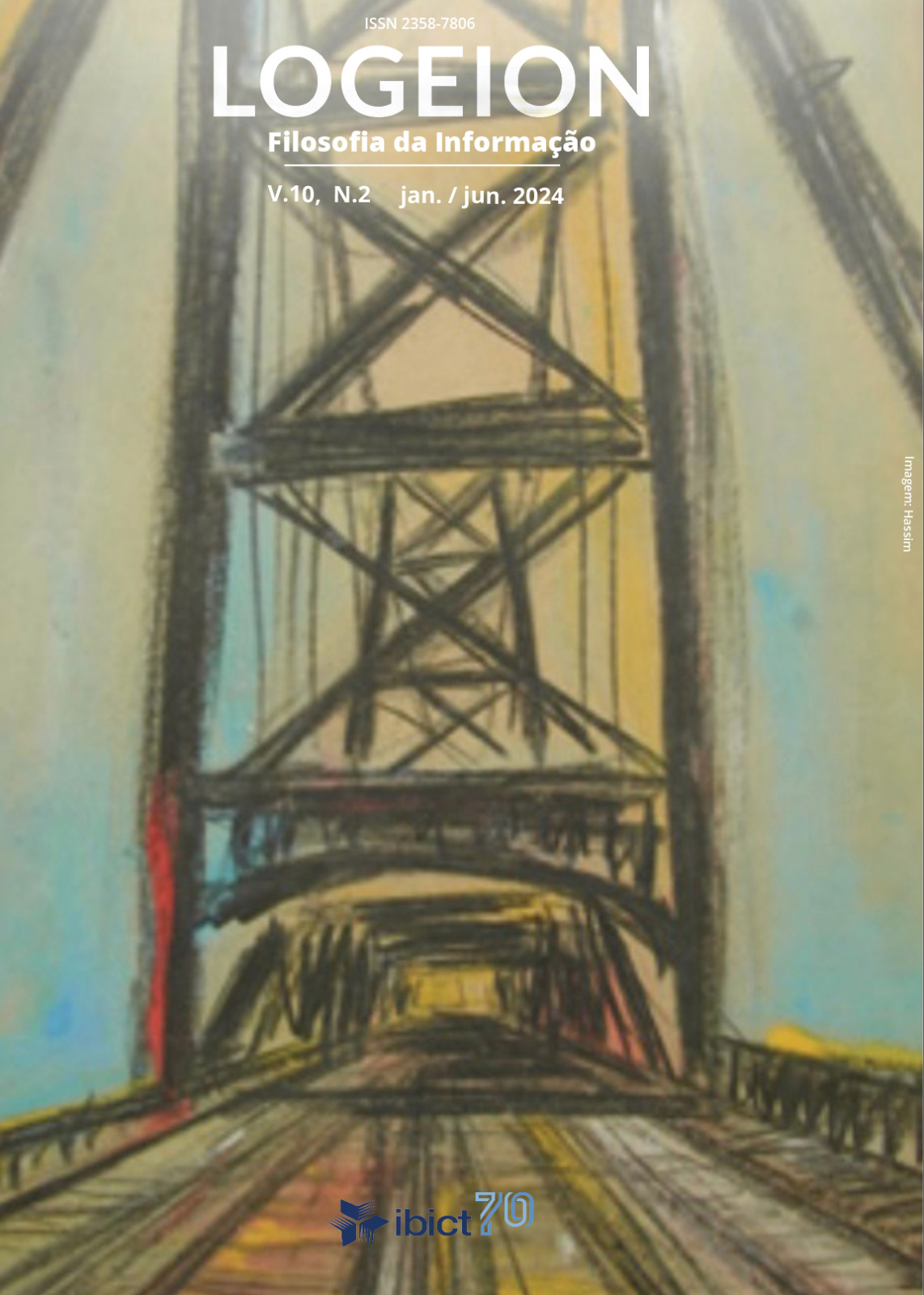A competência em informação no enfrentamento ao plágio no ambiente acadêmico
DOI:
https://doi.org/10.21728/logeion.2024v10n2e-6921Keywords:
Competência em informação, Plágio no meio acadêmico, AutoriaAbstract
This article discusses information literacy in the face of plagiarism in academia. It reflects on the causes of plagiarism, such as the little incentive for students to produce authorial content and the absence of institutional policies that guide such productions. As a response to this context, the article suggests an education for authorship based on information literacy. Information literacy, among others, promotes a healthy relationship between people and the information universe. Thus, the objective is to discuss how promoting information literacy contributes to combating academic plagiarism and establishing authorship. The method involves bibliographical research in databases in the area of Information Science and argumentative construction in which the concepts of plagiarism and information literacy are related. The results include a demonstrative guide on how information literacy can be used in the production of academic work and guidelines for teachers to recognize and avoid plagiarism. The work concludes that the skills generated within the relationship between individuals and information can benefit the construction of authorship and be an effective element in combating plagiarism.
Downloads
References
AZEVEDO, E. Decotelli, novo ministro da Educação, é acusado de plágio em dissertação de mestrado. O Globo, Rio de Janeiro, 27 jun. 2020. Disponível em: https://oglobo.globo.com/epoca/decotelli-novo-ministro-da-educacao-acusado-de-plagio-em-dissertacao-de-mestrado-24503409
BARROS, Susane. ROSA, Flávia. RIBEIRO, Elizabeth M. Princípios e técnicas para elaboração de textos acadêmicos. Salvador: UFBA, 2017. Disponível em: https://educapes.capes.gov.br/bitstream/capes/174974/4/eBook_Principios_e_Tecnicas_para_Elaboracao_de_Textos_Academicos-Especializacao_em_Gestao_de_Pessoas_UFBA.pdf Acesso em: 15 jan. 2023
BAZERMAN, Charles. paying the rent: languaging particularity and novelty. RBLA, Belo Horizonte, v. 10, n. 2, p. 459-469, 2010.
BONETTE, Luzia Maristela. VOSGERAU, Dilmeire Sant'Anna Ramos. O plágio por meio da internet: uma questão ética presente desde o ensino médio. Educação em Revista, Marília, v. 11, n. 2, p. 7-22, jul./dez. 2010. Disponível em: https://revistas.marilia.unesp.br/index.php/educacaoemrevista/article/download/2318/1903/0. Acesso em: 06 fev. 2023.
BORGES, Jussara; BRANDÃO, Gleise; BARROS, Susane Santos. Educação para a informação: como promover competências infocomunicacionais. São Paulo: Pimenta Cultural, 2022.
GALVÃO, Agrazielle Ferreira; LUVIZOTTO, Caroline Kraus. Reflexões sobre a Ética e o Plágio na Pesquisa Científica. In: ENCONTRO DE ENSINO, PESQUISA E EXTENSÃO, Presidente Prudente, out., 2012. Disponível: http://www.unoeste.br/site/enepe/2012. Acesso em: 15 jan. 2023
GOULART, Claudio. Direito autoral descomplicado: soluções práticas para o dia-a-dia. Brasília, DF: Thesaurus, 2009.
HOWARD, Rebecca Moore. Plagiarisms, Authorships, and the Academic Death Penalty, College English, v. 57, n.7, p. 788-806, 1995. Disponível em: https://www.jstor.org/stable/378403
JACOBSEN, Patrícia. Universidades brasileiras contra o plágio. UFRGS, Porto Alegre, 2017. Disponível em: https://www.ufrgs.br/bibliotecacentral/universidades-brasileiras-contra-o-plagio/. Acesso em: 15 jan. 2023.
KROKOSCZ, M. Abordagem do plágio nas três melhores universidades de cada um dos cinco continentes e do Brasil. Revista Brasileira de Educação, v. 16, n. 48, set./dez. 2011.
LILLIS, T. M. Whose ‘Common Sense’? Essayist literacy and the institutional practice of mystery. In: JONES, C.; TURNER, J.; STREET, B. (org.). Students writing in the university: cultural and epistemological issues. Amsterdam: John Benjamins, 1999.
MACHADO, A. M. N. Do modelo ao estilo: possibilidades de autoria em contextos acadêmico-científicos. In: CALIL, E. Trilhas da escrita: autoria, leitura e ensino. São Paulo: Cortez, 2007. P. 171-207.
PENNYCOOK, Alastair. Borrowing Others’ Words: Text, Ownership, Memory, and Plagiarism. Tesol Quartely, v. 30 n. 2, Summer, 1996.
PENNYCOOK, Alastair. Reflecting on Borrwed Words. Tesol Quartely, v. 50, n. 2, June, 2016.
SILVA, Obdália Santana Ferraz. Entre o plágio e a autoria: qual o papel da universidade?. Revista Brasileira de Educação, Rio de Janeiro, v. 13, n. 38. maio/ago. 2008. Disponível em: https://www.scielo.br/pdf/rbedu/v13n38/12.pdf. Acesso em: 30 jun. 2020.
SUPOSTO plágio de candidata a dirigir Suprema Corte agita política mexicana. [S. l.]: UOL, 2022. Disponível em: https://noticias.uol.com.br/ultimas-noticias/afp/2022/12/26/suposto-plagio-de-candidata-a-dirigir-suprema-corte-agita-politica-mexicana.htm Acesso em: 06 fev. 2023.
VITORINO, Elizete Vieira; PIANTOLA, Daniela. Dimensões da competência informacional (2). Ciência da Informação, Brasília, DF, v. 40 n. 1, p. 99-110, jan./abr., 2011. Disponível em: https://www.scielo.br/pdf/ci/v40n1/a08v40n1.pdf. Acesso em: 15 jan. 2023
ZANINI, Leonardo Estevam. Notas sobre o plágio e a contrafação. Revista Doutrina, n. 81. Disponível em: https://revistadoutrina.trf4.jus.br/index.htm?https://revistadoutrina.trf4.jus.br/artigos/edicao081/Leonardo_Estevam_Zanini.html. Acesso em: 07 fev. 2023.
Downloads
Published
Issue
Section
License
Copyright (c) 2024 Jussara Borges, Helena Harthmann, Susane Barros

This work is licensed under a Creative Commons Attribution-NonCommercial-ShareAlike 4.0 International License.
The journal is published under the Creative Commons - Attribution - Noncommercial - Share Alike 3.0 Brazil.
The published work is considered collaboration and therefore the author will not receive any remuneration for this as well as anything will be charged in exchange for publication.
All texts are responsibility of the authors.
It’s allowed partial or total reproduction of the texts of the magazine since the source is cited.














